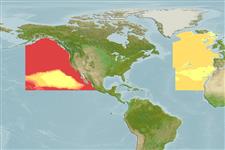Teleostei (teleosts) >
Alepocephaliformes (Slickheads and tubeshoulders.) >
Platytroctidae (Tubeshoulders)
Eponymy: Günther Edmund Maul (1909–1997) was a German ichthyologist and taxidermist who lived and worked most of his life in Madeira. [...] (Ref. 128868), visit book page.
More on authors: Matsui & Rosenblatt.
Environment: milieu / climate zone / depth range / distribution range
Ecology
Marine; bathypelagic; depth range 400 - 1620 m (Ref. 50610). Deep-water; 66°N - 18°N, 160°W - 5°W
Eastern Atlantic: Madeira Islands. Eastern Pacific: British Columbia, Canada (Ref. 11980). Some records of Maulisia argipalla have been misidentified as Maulisia mauli.
Size / Weight / Age
Maturity: Lm ? range ? - ? cm
Max length : 19.5 cm SL male/unsexed; (Ref. 96339)
Meso- and benthopelagic at 850-1500 m (Ref. 58302).
Life cycle and mating behavior
Maturity | Reproduction | Spawning | Eggs | Fecundity | Larvae
Quéro, J.-C., T. Matsui, R.H. Rosenblatt and Y.I. Sazonov, 1984. Searsiidae. p. 256-267. In P.J.P. Whitehead, M.-L. Bauchot, J.-C. Hureau, J. Nielsen and E. Tortonese (eds.) Fishes of the north-eastern Atlantic and the Mediterranean. UNESCO, Paris. Vol. 1. (Ref. 6682)
IUCN Red List Status (Ref. 130435: Version 2025-1)
Threat to humans
Harmless
Human uses
Tools
Special reports
Download XML
Internet sources
Estimates based on models
Preferred temperature (Ref.
123201): 3.4 - 7.5, mean 5.8 °C (based on 93 cells).
Phylogenetic diversity index (Ref.
82804): PD
50 = 0.5312 [Uniqueness, from 0.5 = low to 2.0 = high].
Bayesian length-weight: a=0.01122 (0.00514 - 0.02450), b=3.04 (2.87 - 3.21), in cm total length, based on all LWR estimates for this body shape (Ref.
93245).
Trophic level (Ref.
69278): 3.4 ±0.5 se; based on size and trophs of closest relatives
Resilience (Ref.
120179): Medium, minimum population doubling time 1.4 - 4.4 years (Assuming tmax>3).
Fishing Vulnerability (Ref.
59153): Low vulnerability (14 of 100).
🛈
